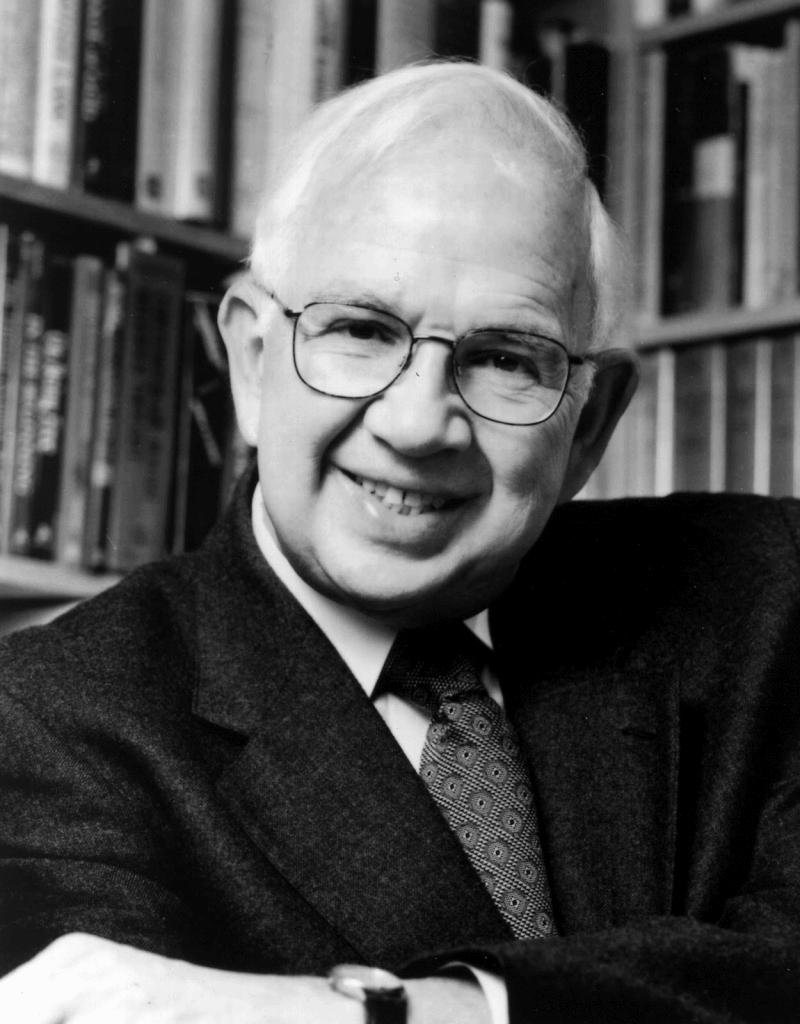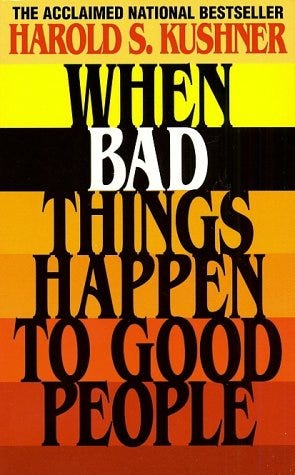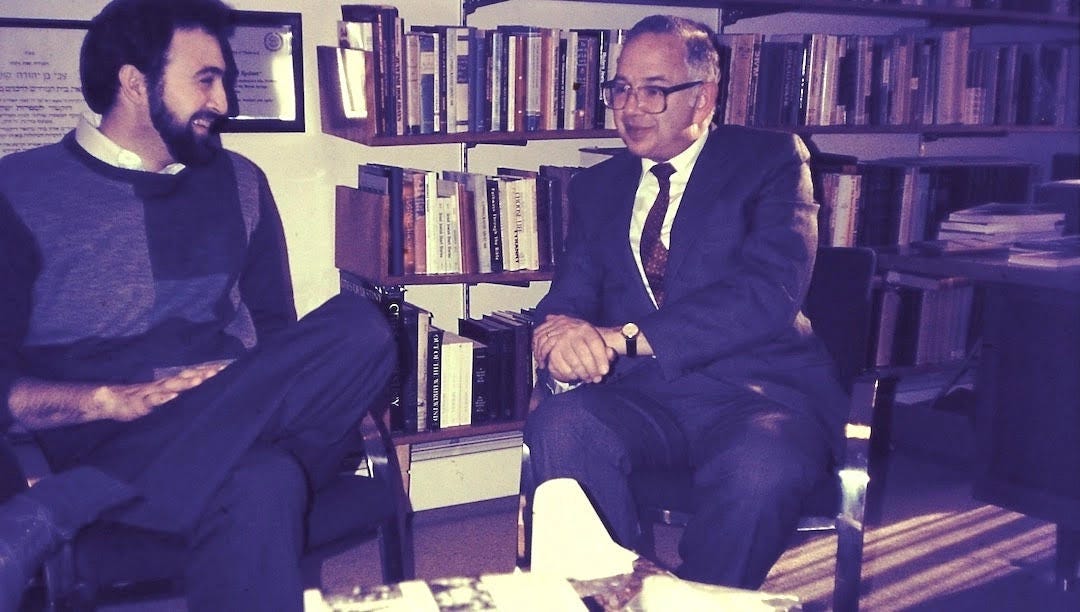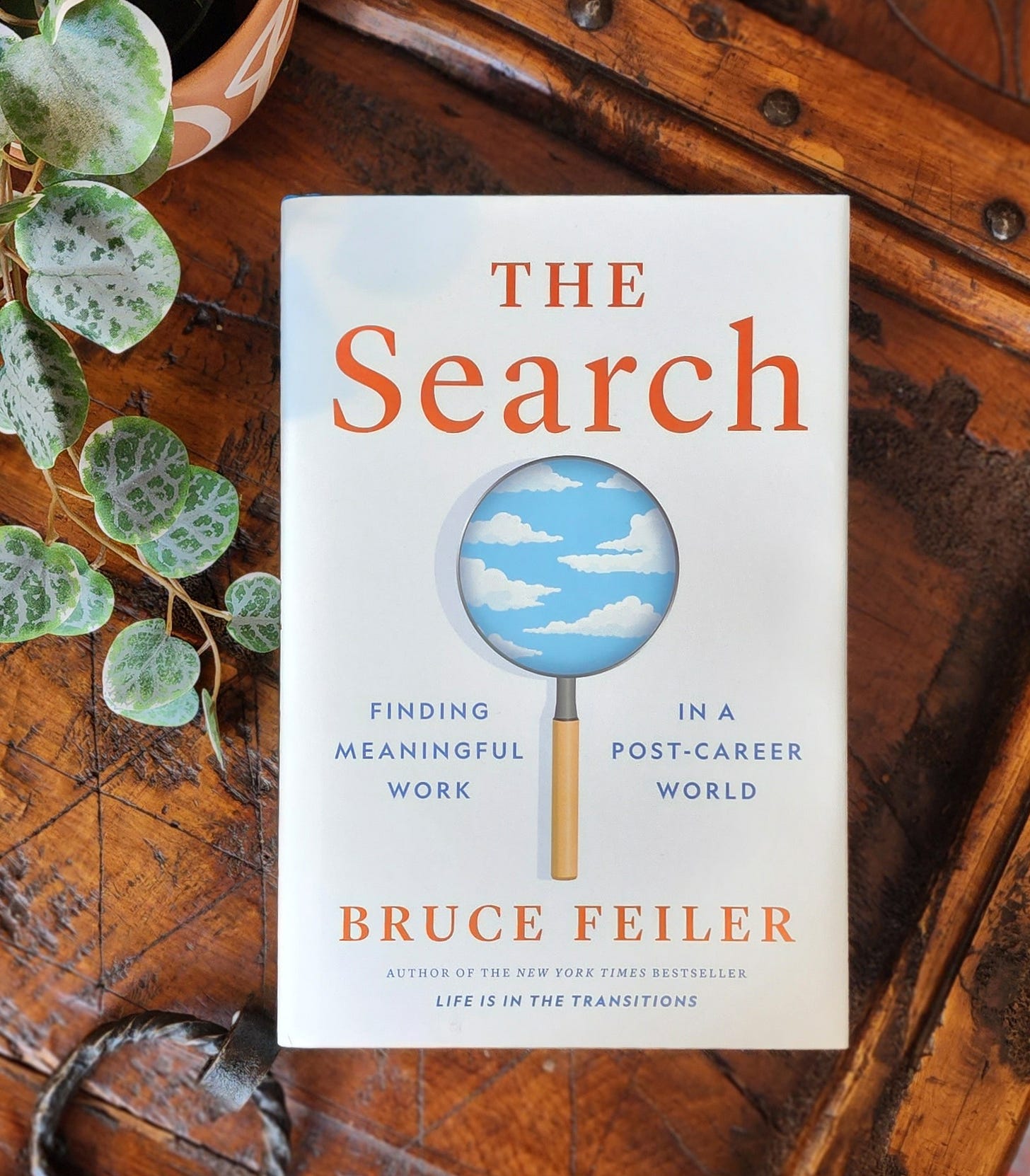When Bad Things Happen to Good People
Remembering Rabbi Harold Kushner and the Lessons He Taught Me -- and the World
Thanks for reading The Nonlinear Life, a reader-supported newsletter about navigating life's ups and downs. If you or someone you know is looking for joy in their life, please check out my new book, The Search: Finding Meaningful Work in a Post-Career World. Perfect for new college grads—among others! If you're new around here, learn about me, or check out our introductory post. And if you enjoyed this article, please subscribe or share with a friend.
Rabbi Harold Kushner, who died late last week at age 88, was a mild-mannered rabbi of Temple Israel in in Natick, Massachusetts, on November 19, 1966, when his wife, Suzette, gave birth their second child, a daughter named Ariel. A mere 12 hours later, the family’s pediatrician delivered the news that would change not only the Kushners’ lives but that of millions of people around the world.
Ariel’s older brother, 3-year-old Aaron, had a rare disease called progeria, colloquially known as “rapid aging.”
“We learned that our happy, outgoing son would look like a little old man while he was still a child,” Kushner later recalled. “We were told that Aaron would have no hair on his head or body; he would never grow beyond three feet in height and he would die in his early teens.”
“What I felt most that day was a deep, aching sense of unfairness. I had been a good person and always tried to do what was right. More than that, I was living a more religiously committed life than most people I knew — people who had large, healthy families. I had assumed my side of the bargain, so how could this be happening to my family? If God existed, if He was minimally fair, let alone loving and forgiving, how could He do this to me?”
At 10, Aaron was physiologically in his 60s; he bought clothes designed for toddlers and was so weak even tried to sleep standing up. Two days after his 14th birthday Aaron died in his mother's arms. He weighted 25 pounds.
Eighteen months later, his father sat down to start writing a book that might help him cope with his “grief, frustration, and rage.”
Published in 1981, When Bad Things Happen to Good People went on to become one of the most influential books in modern spirituality, selling four million copies and being translated into a dozen languages. “I am the rabbi of a congregation of six hundred families, or about twenty-five hundred people,” Rabbi Kushner writes in the opening chapter.
I visit them in the hospital, I officiate at their funerals, I try to help them through the wrenching pain of their divorces, their business failures, their unhappiness with their children. I sit and listen to them pour out their stories of terminally ill husbands or wives, of senile parents for whom a long life is a curse rather than a blessing, of seeing people whom they love contorted with pain or buried by frustration. And I find it very hard to tell them that life is fair, that God gives people what they deserve and need. Time after time, I have seen families and even whole communities unite in prayer for the recovery of a sick person, only to have their hopes and prayers mocked. I have seen the wrong people get sick, the wrong people be hurt, the wrong people die young.
The question people ask in this situation is very simple, Kushner goes on to say: Why do bad things happen to good people?” But there is no answer to this question, he insists.
I don’t know why one person gets sick, and another does not, but I can only assume that some natural laws which we don’t understand are at work. I cannot believe that God ‘sends’ illness to a specific person for a specific reason. I don’t believe in a God who has a weekly quota of malignant tumors to distribute, and consults His computer to find out who deserves one most or who could handle it best.
‘What did I do to deserve this?’ is an understandable outcry from a sick and suffering person, but it is really the wrong question. Being sick or being healthy is not a matter of what God decides that we deserve. The better question is, ‘If this has happened to me, what do I do now, and who is there to help me do it?’
And therein lay the gift that Rabbi Kushner gave to the world. The proper question is not WHY Do Bad Things Happen to Good People; it’s how do you react WHEN Bad Things Happen to Good People.
We can't pray that God make our lives free of problems; this won't happen, and it is probably just as well. We can't ask Him to make us and those we love immune to diseases, because He can't do that. We can't ask Him to weave a magic spell around us so that bad things will only happen to other people, and never to us.
People who pray for miracles usually don't get miracles, any more than children who pray for bicycles, good grades, or good boyfriends get them as a result of praying. But people who pray for courage, for strength to bear the unbearable, for the grace to remember what they have left instead of they have lost, very often find their prayer answered.
Rabbi Kushner’s answer turned the unassuming pulpit leader into America’s rabbi-in-chief. As my friend, Rabbi Jeff Salkin, pointed out in a memoriam this week, observers often quip: “There are only two categories of Jewish books: When Bad Things Happen to Good People and everything else.”
Rabbi Kushner had been a celebrity for almost 30 years by the time I met him, interviewed him, and appeared alongside him on a number of occasions in the early 2000, during a period in which I published a series of book on similar themes, including Walking the Bible and Abraham. In some ways he was the least likely celebrity I ever met. He was not imposing physically, not particularly gifted orally, and not especially charismatic.
But what the soft-spoken Brooklyn-native was, instead, was deeply wise, profoundly insightful, and extremely generous, both in front of a crowd and interpersonally. When I posted a brief memory of him on social media over the weekend, friends shared stories that while giving a speech in California he insisted on visiting the home of his host because her child was suffering from an automobile accident.
My friend Joshua Weiss, who was a congregant of Rabbi Kushner’s in Natick, Mass, as a boy, wrote, “I think Rabbi Kushner took a liking to me because I also had what some would consider a deformity. I was born with only a thumb on my right hand. Of course, my ‘issue’ paled in comparison to what he and Aaron had to deal with, but Rabbi Kushner used his own situation to show the rest of us how to handle our own. He had Aaron participate in everything and created a level of normalcy. I can genuinely say that is all anyone wants when they have a ‘difference.’”
Josh went on to become a professional public speaker, negotiator, and author.
As it happens, Rabbi Kushner shared his own thoughts on his life in one of his final books, Nine Essential Things I’ve Learned About Life:
Dear World,
We’ve been through a lot together over the past eight decades, you and I —marriages, births, deaths, fulfillment and disappointment, war and peace, good times and hard times. There were days when you were more generous to me than I could possibly have deserved. And there were days when you cheated me out of things I felt I was entitled to. There were days when you looked so achingly beautiful that I could hardly believe you were mine, and days when you broke my heart and reduced me to tears. But with it all, I choose to love you. I love you, whether you deserve it or not (and how does one measure that?). I love you in part because you are the only world I have. I love you because I like who I am better when I do. But mostly I love you because loving you makes it easier for me to be grateful for today and hopeful about tomorrow. Love does that.
Faithfully yours,
Harold Kushner
Godspeed, Harold Kushner. Thank you for all you taught me – and for all you taught the world. Your wisdom will live on from generation to generation. And maybe we can heed your lesson to us all: choose hope; choose hope; and choose to be the who in someone’s love who helps them in their time of pain.
☀
Thank you for reading The Nonlinear Life. This is a reader supported newsletter. You can help by preordering my new book, The Search: Finding Meaningful Work in a Post-Career World, a bold new roadmap for finding meaning and purpose at work based on life stories of hundreds of Americans from all walks of life. Click on the photo below for more information and reserve your copy today.
Meanwhile, please help us grow the community by subscribing, sharing, and commenting below. If you'd like to do a storytelling project with a loved one similar to the one I did with my father, click here to learn more.
You might enjoy reading these posts:
The Meaning of 18: Lines Written on the Occasion of My Daughters' 18th Birthday
The Myth of 10,000 Steps: Why Walks Are Good for You – But Not All Walks
What’s the Hardest Part of a Life Transition?
Or check out my books that inspired this newsletter: Life Is in the Transitions and The Secrets of Happy Families.
Or, you can contact me directly.











I found this book to me after my husband died. He was an ugly person - a narcissist- who was cruel and and died from Stage IV Colon Cancer. I only stayed with him to honor my vows. I had been trying to exit. He had gone to this therapist with a message: “I want you to fix my wife. She won’t do what I want her to do”.
Over the next three years the level of degradation increased until finally he was holding me at bay outside of our bedroom with a rifle and no way to escape. He had even taken the phone.
I was angry at God. I lost my physical and mental health. I lost my ability to work. I lost my home. The emotional and physical abuse was too devastating to make a full recovery in terms that would allow me to continue on with my life as I had once known. My life experience was devastating and I am now in assisted living making the best life for myself knowing that it was God who walked with me through this horrible time. He was not punishing me for any past transgressions. He was walking with me and it was after reading this book that I broke down realizing that He had been with me all along. And, interestingly enough, that’s what led me to buying my first book of yours, “Abraham”.
Every time I write about Rabbi Kushner and this book I start crying. I’m starting to cry right now writing this. This is how impactful “When Bad Things Happen to Good People” has been in transformational in turning my hurt and anger towards a situation I could not change into empowerment to help other people facing difficult times.
It’s the only book I recommend to people facing loss. I tell them to buy it. They don’t even need to pick it up until a later time.
I thanked Rabbi Kushner in my heart more times that I can remember for the beautiful gift he gave me. He freed my soul.
Thank you for sharing this.